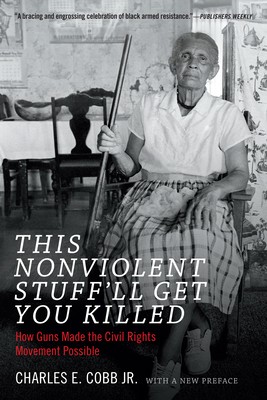
- We will send in 10–14 business days.
- Author: Charles E Cobb
- Publisher: Duke University Press
- ISBN-10: 082236123X
- ISBN-13: 9780822361237
- Format: 15.2 x 22.6 x 2 cm, softcover
- Language: English
- SAVE -10% with code: EXTRA
Reviews
Description
Visiting Martin Luther King Jr. during the Montgomery, Alabama, bus boycott, journalist William Worthy almost sat on a loaded pistol. "Just for self-defense," King assured him. It was not the only weapon King kept for such a purpose; one of his advisors remembered the reverend's Montgomery, Alabama, home as "an arsenal." Like King, many ostensibly "nonviolent" civil rights activists embraced their constitutional right to self-protection--yet this crucial dimension of the Afro-American freedom struggle has been long ignored by history. In This Nonviolent Stuff'll Get You Killed, Charles E. Cobb Jr. recovers this history, describing the vital role that armed self-defense has played in the survival and liberation of black communities. Drawing on his experiences in the civil rights movement and giving voice to its participants, Cobb lays bare the paradoxical relationship between the nonviolent civil rights struggle and the long history and importance of African Americans taking up arms to defend themselves against white supremacist violence.
EXTRA 10 % discount with code: EXTRA
The promotion ends in 16d.16:40:33
The discount code is valid when purchasing from 10 €. Discounts do not stack.
- Author: Charles E Cobb
- Publisher: Duke University Press
- ISBN-10: 082236123X
- ISBN-13: 9780822361237
- Format: 15.2 x 22.6 x 2 cm, softcover
- Language: English English
Visiting Martin Luther King Jr. during the Montgomery, Alabama, bus boycott, journalist William Worthy almost sat on a loaded pistol. "Just for self-defense," King assured him. It was not the only weapon King kept for such a purpose; one of his advisors remembered the reverend's Montgomery, Alabama, home as "an arsenal." Like King, many ostensibly "nonviolent" civil rights activists embraced their constitutional right to self-protection--yet this crucial dimension of the Afro-American freedom struggle has been long ignored by history. In This Nonviolent Stuff'll Get You Killed, Charles E. Cobb Jr. recovers this history, describing the vital role that armed self-defense has played in the survival and liberation of black communities. Drawing on his experiences in the civil rights movement and giving voice to its participants, Cobb lays bare the paradoxical relationship between the nonviolent civil rights struggle and the long history and importance of African Americans taking up arms to defend themselves against white supremacist violence.


Reviews